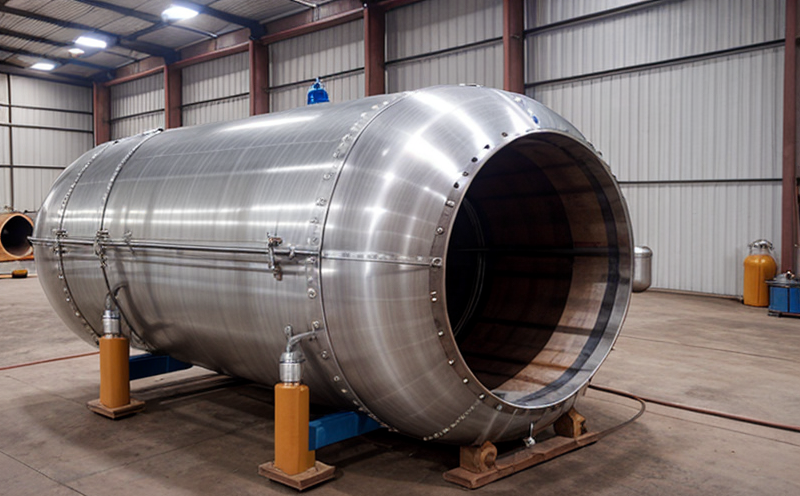Pressure vessel integrity inspection
The process of pressure vessel integrity inspection is critical to ensuring safe and efficient operation across various industrial sectors. Pressure vessels are used in many industries, including pharmaceuticals, chemical processing, oil refining, and power generation. These vessels must withstand high internal pressures and contain hazardous or corrosive materials.
The primary goal of this inspection is to identify potential flaws, defects, or weaknesses that could lead to catastrophic failures. By conducting regular inspections, operators can prevent accidents, reduce downtime, and ensure compliance with regulatory standards such as ASME (American Society of Mechanical Engineers), PED (Pressure Equipment Directive), and others.
At Eurolab, our team specializes in providing comprehensive pressure vessel integrity inspections using advanced non-destructive testing techniques. Our approach ensures that the vessels are safe for continued operation while minimizing disruption to your business processes.
To begin with, we conduct a thorough visual examination of the vessel's exterior and interior surfaces. This initial inspection helps us identify any obvious signs of wear or damage. Following this step, our experts apply specific non-destructive testing (NDT) methods tailored to each vessel’s unique requirements:
- Ultrasonic Testing (UT)
- Magnetic Particle Inspection (MPI)
- Dye Penetrant Inspection (DPI)
- Eddy Current Testing (ECT)
The choice of NDT method depends on factors such as the material type, geometry, and service history of the vessel. Ultrasonic testing is particularly useful for detecting internal flaws in thick-walled vessels, while magnetic particle inspection excels at identifying surface-breaking defects.
After completing all inspections, Eurolab generates detailed reports that include:
- A summary of findings
- Photos and videos from the inspection process
- Data from all NDT methods used
- An assessment of remaining service life based on ASME guidelines
- Recommendations for any necessary repairs or replacements
Our team also provides recommendations for maintenance schedules to help extend the useful life of your pressure vessels. By following these guidelines, you can avoid costly downtime and ensure ongoing compliance with relevant regulations.
In addition to our technical expertise, Eurolab’s commitment to quality is reflected in our adherence to international standards such as ASME Section VIII Division 1 & 2, PED Directive 2014/68/EU, and EN 13445. We ensure that every inspection adheres strictly to these stringent requirements.
Applied Standards
| Standard | Description |
|---|---|
| ASME Section VIII Division 1 & 2 | This standard provides rules and regulations for the design, construction, inspection, and operation of high-pressure pressure vessels. |
| PED Directive 2014/68/EU | The Pressure Equipment Directive sets out safety requirements for pressurized systems in Europe. It ensures that only safe equipment is placed on the market. |
| EN 13445:2019 | This European standard covers design, fabrication, and testing of pressure vessels used in the process industry. |
| Standard | Description |
|---|---|
| ISO 9001:2015 | This international standard specifies requirements for a quality management system that ensures continuous improvement and effective performance. |
| IEC 61800-7-2 | This IEC standard provides guidelines for the testing of wind turbine gearboxes, which often contain pressure vessels. |
Eurolab Advantages
At Eurolab, we pride ourselves on offering unparalleled expertise in pressure vessel integrity inspection. Our team comprises highly skilled professionals who bring extensive experience to every project. Here are some of the key advantages our clients enjoy:
- Comprehensive NDT Methods: We utilize a wide range of non-destructive testing techniques to ensure thorough inspections.
- Regulatory Compliance: Our services meet or exceed all relevant ASME, PED, and EN standards.
- Expertise in Various Materials: We have extensive experience working with different materials commonly found in pressure vessels.
- Fast Turnaround Times: Thanks to our efficient processes, we can complete inspections quickly without compromising quality.
- Custom Solutions: Whether you need routine inspections or specialized services for unique applications, we offer tailored solutions.
- Post-Inspection Support: Our team is available to assist with any follow-up actions required after the inspection.
We understand that time is money in industrial settings. Therefore, our goal is not just to meet but exceed your expectations by delivering accurate results promptly and reliably.
Environmental and Sustainability Contributions
- Safety First: By ensuring the integrity of pressure vessels, we prevent leaks that could release hazardous substances into the environment.
- Resource Efficiency: Our inspections help extend the useful life of existing equipment, reducing the need for new manufacturing and thus conserving resources.
- Energy Savings: Well-maintained pressure vessels operate more efficiently, leading to reduced energy consumption and lower carbon footprints.
- Regulatory Compliance: Adherence to strict standards ensures that our inspections contribute positively to environmental protection efforts.
Incorporating these aspects into our services supports sustainable practices within industries where pressure vessels play a crucial role. Through careful inspection and maintenance, we help protect both people and the planet.





